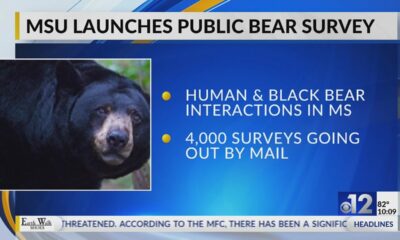Mississippi Today
Gov. Reeves vetoes four felony voting restoration bills, yet signs two into law for first time
Republican Gov. Tate Reeves on Monday night vetoed a handful of bills that would have restored voting rights to four people who had completed the terms of their prison sentences for grand larceny and burglary convictions.
But Reeves, who has never approved of a suffrage restoration bill since taking office in 2020, signed two measures into law that restored suffrage for two people. He also allowed 12 other suffrage restoration bills to become law without his signature, which is his usual practice.
It's unclear why the second-term governor made the unusual decision to approve suffrage bills for the first time, let others become law without his signature, and vetoed others.
His office did not respond to a request for comment about his actions on the bills. He also did not attach a message to his four vetoes, despite the state constitution's requirement that the governor return any vetoed bills to the Legislature “with his objections.”
The governor's veto means that the four people will, at least for now, be unable to vote in any election despite an overwhelming majority of the Legislature choosing to restore their suffrage.
The Legislature could attempt to override the governor's veto, but it would be extremely unlikely. It takes a two-thirds majority vote in both chambers to override a governor's veto, and the Legislature has not overridden a gubernatorial veto over suffrage measures in recent years.
House Speaker Jason White, a Republican from West, and Republican Lt. Gov. Delbert Hosemann, the leader of the Senate, decided on Monday evening that the Legislature will not convene on Tuesday to override any of Reeves' vetoes.
Under the Mississippi Constitution, people convicted of any of 10 felonies — including perjury, arson and bigamy — lose their voting rights for life. Opinions from the Mississippi Attorney General's Office have since expanded the list of disenfranchising felonies to 24.
The practice of stripping voting rights away from people for life is a holdover from the Jim Crow era because the framers of the 1890 constitution believed the people most likely to commit those crimes were Black people.
About 55,000 names are on the Secretary of State's voter disenfranchisement list as of March 19. The list, provided to Mississippi Today through a public records request, goes back to 1992 for felony convictions in state court.
The state constitution grants lawmakers the power to restore suffrage to citizens, but the process is arduous. It necessitates a two-thirds majority vote in both legislative chambers to favor restoring suffrage in individual cases, a challenging task.
The House overwhelmingly passed a proposal this year that would have automatically restored voting rights to people convicted of nonviolent felony crimes, but Senate Constitution Committee Chairwoman Angela Burks Hill, a Republican from Picayune, killed it without bringing it up for debate.
After Hill killed the House proposal, lawmakers were forced to continue to restore suffrage piecemeal to individuals.
Hosemann, who appointed Hill to chair the committee, told reporters in May that he believes people should regain their suffrage if they were convicted of a nonviolent crime and after completing the terms of their prison sentence.
But the thinks senators would have balked at the House's overhaul proposal because they like to consider each individual suffrage bill.
“Just giving a blanket is pretty hard,” Hosemann said. “I think senators want to vote individually.”
A federal appeals court is also considering litigation brought by the Southern Poverty Law Center, contending that the state's lifetime voting ban on certain felony offenses violates the 8th Amendment's protection from cruel and unusual punishment.
In August, a three-judge panel of the 5th Circuit, in a 2-1 decision, agreed with the plaintiffs and found that the lifetime voting ban violates the U.S. Constitution.
But the full panel of the court, known for its conservative rulings, vacated the decision of the three-judge panel and asked for a rehearing among all of the court's members. It is not known when the full panel – about 20 judges — will rule on the issue. But the full panel's ruling will likely be appealed to the U.S. Supreme Court.
This article first appeared on Mississippi Today and is republished here under a Creative Commons license.
Mississippi Today
Mississippi judge blocks Biden attempt to ensure LGBTQ+ medical treatment
A federal judge in Mississippi has blocked enactment of a Biden administration rule designed to prevent medical care from being denied to those seeking treatment related to gender identity or sexual orientation.
The lawsuit U.S. Southern District Judge Louis Guirola Jr. ruled on Wednesday was filed by 15 states, including Mississippi. But he said his injunction preventing the Biden administration from enforcing its rule would apply nationwide. His ruling is likely to be appealed.
On social media, the Human Rights Campaign proclaimed, “This is not over. All LGBTQ+ people should receive the health care we deserve and be able to make informed decisions about our own bodies.”
The Biden administration rule enacted earlier this year is designed to ensure those seeking medical care on the basis of gender identity or sexual orientation are not subject to discrimination. The rule is supposed to cover entities receiving federal funds for the delivery of health care.
The states argued against being forced to provide gender-affirming care through Medicaid programs or through health plans for state employees. In addition, the states argued against private insurance companies being required to provide such care.
“Injecting gender identity into our state's medical system is a dangerous pursuit of a political agenda from the Biden Administration,” Mississippi Attorney Lynn Fitch said in a statement. “Medical professionals should not be forced to provide gender transition surgeries or drugs against their judgment and hospitals should not be prohibited from providing women-only spaces for patients. I am proud to lead the multistate effort with Tennessee Attorney General Jonathan Skrmetti to stop the Biden Administration and push back on this reckless rule.”
The lawsuit is one of many filed by attorneys general and others objecting to the Biden administration interpreting Title IX to apply to banning discrimination based on sexual orientation and sexual identity. Congress passed, and President Richard Nixon signed into law, Title IX in 1972 to ban sexual discrimination.
In response to one of the similar lawsuits ruled on earlier in Louisiana, Kelley Robinson, president of the Human Rights Campaign, said, “Every student … deserves to be safe. Every young person deserves protection from bullying, misgendering and abuse.”
Robinson added, referring to the earlier court ruling, “This is MAGA theatrics with the dangerous goal of weaving discrimination into state law.”
Mississippi has passed a state law prohibiting minors from receiving gender-affirming care even if it is recommended by physicians.
On social media, Gov. Tate Reeves said, “The Biden Administration attempted to undermine Title IX by dramatically reinterpreting its meaning to now apply to gender identity. Thankfully, a federal court judge has sided with Mississippi and other states who chose to stand up for women and defend Title IX as it currently exists.”
The lawsuit filed by Fitch and other attorneys general argued that their states could be penalized by the loss of federal Medicaid funds, for example, if they did not adhere to the rule.
In blocking the rule. Guirola cited the Chevron case where the U.S. Supreme Court recently said that federal agencies should not be given deference in their rules-making.
This article first appeared on Mississippi Today and is republished here under a Creative Commons license.
Mississippi Today
State GOP plans to endorse judicial candidates, while Democratic Party does not

The leaders of the Mississippi's two major political parties recently offered two opposing plans for how much they plan to interact with candidates competing for one the state's three contested races for the state Court of Appeals and the state Supreme Court.
Mississippi Republican Party Chairman Mike Hurst told Mississippi Today on the June 24 edition of Mississippi Today's “The Other Side” podcast that the GOP will likely endorse certain candidates in the race, while Mississippi Democratic Party Chairman Cheikh Taylor said on the July 1 episode of the podcast that judicial endorsements are not on the party's radar.
Judicial elections tend to be low-interest races, but the elections this year will take place on the same ballot as the presidential and congressional elections. If a major political party endorses a candidate, it could give them more name recognition at the ballot box.
“I know it's a nonpartisan race, and I think there should be a clear dividing line between the campaigns for nonpartisan races and the partisan entities like the Republican Party,” Hurst said. “But at the same time, we all know that there are differences that judicial candidates hold in their opinions on how to interpret the constitution and how to interpret statutes.”
Candidates for the Mississippi Court of Appeals and the Mississippi Supreme Court are required to run as nonpartisan, meaning they do not run in a party primary. However, political parties can still endorse candidates running for those offices.
For a few years, state law banned parties from endorsing or donating money to nonpartisan judicial candidates. But the state GOP in 2002 filed a federal lawsuit challenging the ban. U.S. District Judge Henry T. Wingate struck down the ban as unconstitutional, saying it was a violation of the U.S. Constitution's First Amendment.
Taylor, who just won election to a full term as Democratic Party chairman, said the party is still in a “rebuilding phase” and has to carefully decide which races it should get involved with.
“There are so many races to get involved in and so many ways that funding is limited,” Taylor said. “We are structuring now to broaden our base to make sure that fundraising is not an issue moving forward.”
There are three contested judicial races this year: an open seat on the Mississippi Court of Appeals and two Mississippi Supreme Court races where incumbents face challengers.
In the Central District race for the Supreme Court, longtime incumbent Justice Jim Kitchens, a senior member of the Court, faces a challenge from four candidates: Abby Robinson, Ceola James, Byron Carter and Jenifer Branning. In the Southern District race, incumbent Justice Dawn Beam faces a challenge from David Sullivan.
Three people are competing for an open Court of Appeals seat: Jennifer Schloegel, Amy Lassiter St. Pe and Ian Baker.
All candidates will appear on the Nov. 5 general election ballot. If a candidate does not receive a majority of the votes cast, the two candidates who received the most votes will advance to a runoff election on Nov. 26.
This article first appeared on Mississippi Today and is republished here under a Creative Commons license.
Mississippi Today
Federal judges order Mississippi Legislature to create more Black districts, may prompt 2024 elections
The Mississippi Legislature has been ordered to create more Black-majority House and Senate Districts by a federal three-judge panel.
“The court rightly held that the Mississippi Legislature used the redistricting process to dilute the power of Black voters. Those legislative districts denied Black Mississippians an equal voice in state government,” said Jarvis Dortch, executive director of the ACLU of Mississippi.
The judges ruled in a lawsuit filed on behalf of the Mississippi Conference of the NAACP and Black voters from across the state that the districts that were drawn in 2022 by the state Legislature diluted Black voting strength. Legislative redistricting occurs every 10 yeas after the federal census.
In the ruling, released late Tuesday, the federal panel said it would give the Legislature the opportunity to redraw the districts, but added, “It is the desire of this court to have new legislators elected before the 2025 legislative session convenes, but the parties can make whatever arguments about timing they conclude are valid.”
The state, which opposed the lawsuit, can argue for more time to redraw the districts. Or the state could appeal the ruling to the U.S. Supreme Court.
MaryAsa Lee, a spokesperson for Republican Attorney General Lynn Fitch's office, said the agency is currently reviewing the court's opinion. She did not say whether Fitch wanted to appeal the order.
The federal panel did not accept all of the arguments of the NAACP and other plaintiffs. But the panel ruled that Black-majority Senate districts should be drawn at least in the DeSoto County area in north Mississippi and in the Hattiesburg area in south Mississippi. In addition, a new Black majority House district should be drawn in the Chickasaw County area in northeast Mississippi.
The state has a Black population of about 38%. Currently there are 42-Black majority districts in the 122-member House and 15 Black majority districts in the 52-seat Senate.
Multiple groups represented the NAACP and other plaintiffs in the case.
The three judges serving on the panel were all appointed by Republican President George W. Bush.
Charles Taylor, executive director of the Mississippi State Conference of the NAACP, said he was pleased with the decision “although we wish the court had gone further.”
The NAACP and others argued the totality of the 2022 redistricting by the Legislature diluted Black voting strength. Groups argued by “packing” a large percentage of Black voters in a concentrated number of districts it deprived them from having an impact in other districts. The three judge panel did not accept the total argument of the plaintiffs.
But still, the people who brought the lawsuit maintained the decision of the federal panel was a victory for Black Mississippians.
“This ruling brings us much closer to the goal of ensuring that Mississippi has a fair number of majority-Black legislative districts to go along with the majority-white ones,” said Rob McDuff, an attorney with the Mississippi Center for Justice.
READ MORE: Lawsuit claiming Mississippi Supreme Court districts are discriminatory is set for August
The Lawyers' Committee for Civil Rights Under Law, the American Civil Liberties Union, ACLU of Mississippi, the law firm of Morgan, Lewis & Bockius, Mississippi Center for Justice and civil rights attorney Carroll Rhodes all participated in the case.
“This ruling affirms that the voices of Black Mississippians matter and should be reflected in the state Legislature,” said Jennifer Nwachukwu, of the Lawyers' Committee for Civil Rights Under Law Voting Rights Project.
The next step will be for either the state to appeal or present arguments to the federal panel on why the new districts should not be drawn and filled via election before the 2025 legislative session.
This article first appeared on Mississippi Today and is republished here under a Creative Commons license.
-
Mississippi News6 days ago
Pearl under boil water notice due to E. coli
-
Mississippi News7 days ago
Tropical wave has a 70 percent chance of developing, National Hurricane Center says
-
Mississippi Business7 days ago
Communities qualify for Welcome Home Mississippi recertification
-
Our Mississippi Home7 days ago
Mississippi State’s UTC Staff Win Seven Emmy Awards
-
SuperTalk FM6 days ago
Move over 662, a new area code is coming to north Mississippi
-
Our Mississippi Home7 days ago
Celebrating the 15th Season of Festival South
-
Kaiser Health News7 days ago
Supreme Court Upends Purdue Pharma Opioid Settlement
-
Mississippi News6 days ago
Youth Court Judge says there is a dire need for foster homes – Home – WCBI TV



































